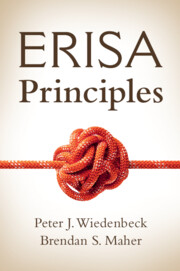Book contents
- ERISA Principles
- ERISA Principles
- Copyright page
- Contents
- Acknowledgments
- Table of Cases
- Table of Legislation
- Table of Rules and Regulations
- Part I General Considerations
- Part II Conduct Controls: Welfare and Pension Plans
- 3 Disclosure
- 4 Fiduciary Obligations
- 5 Enforcement
- 6 Preemption
- Part III Content Controls: Pension Plans
- Part IV Tax Controls: Qualified Retirement Savings
- Part V Health Plan Content Controls
- Appendix ERISA’s Legislative History
- Index
3 - Disclosure
from Part II - Conduct Controls: Welfare and Pension Plans
Published online by Cambridge University Press: 15 February 2024
- ERISA Principles
- ERISA Principles
- Copyright page
- Contents
- Acknowledgments
- Table of Cases
- Table of Legislation
- Table of Rules and Regulations
- Part I General Considerations
- Part II Conduct Controls: Welfare and Pension Plans
- 3 Disclosure
- 4 Fiduciary Obligations
- 5 Enforcement
- 6 Preemption
- Part III Content Controls: Pension Plans
- Part IV Tax Controls: Qualified Retirement Savings
- Part V Health Plan Content Controls
- Appendix ERISA’s Legislative History
- Index
Summary
ERISA grants claimants a private right of action to recover benefits due to them or to obtain “appropriate equitable relief” to enforce statutory obligations, including disclosure requirements and fiduciary duties. This civil enforcement mechanism puts teeth in the disclosure regime, as the courts have found that an incomplete or erroneous description of plan terms can sometimes bind the plan or trigger fiduciary liability. Disclosure of plan finances may deter fiduciary misconduct. Should deterrence fail, disclosure provides plan participants and beneficiaries the information they need to monitor plan administration to enforce their rights. Disclosure also gives workers the information to evaluate their employment and retirement options, allowing them to adjust their personal financial affairs to the employer’s program. Appreciating pension plan limits enables participants to determine the extent of additional individual savings needed to provide sufficient resources in retirement. Knowledge about welfare benefits assists workers making decisions about their need to save for health care costs not covered by the employer’s plan, or to secure additional life or disability insurance. This planning function promotes economic efficiency.
Keywords
- Type
- Chapter
- Information
- ERISA Principles , pp. 61 - 115Publisher: Cambridge University PressPrint publication year: 2024

